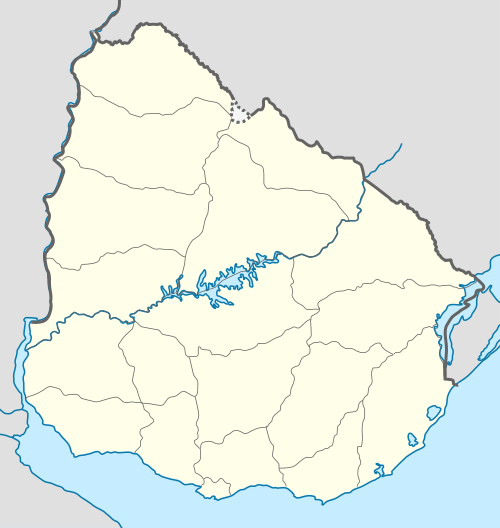Sauce, Uruguay
| Sauce | |
|---|---|
| City | |
 Sauce Location in Uruguay | |
| Coordinates: 34°39′0″S 56°4′0″W / 34.65000°S 56.06667°WCoordinates: 34°39′0″S 56°4′0″W / 34.65000°S 56.06667°W | |
| Country |
|
| Department | Canelones Department |
| Founded | 1851 |
| Population (2011) | |
| • Total | 6,132 |
| Time zone | UTC -3 |
| Postal code | 90800 |
| Dial plan | +598 2 (+7 digits) |
Sauce is a small city in the Canelones Department of southern Uruguay.
Sauce is also the name of the municipality to which the city belongs.
Location
The city is located on Km. 36 of Route 6 and its intersection with Routes 67, 86 and 107. It is part of the wider metropolitan area of Montevideo.
Geography
The stream Arroyo Sauce flows along the east and the south limits of the city, and also through the park Parque Artigas.
History
It was founded on 12 October 1851. On 29 September 1915 it was declared a "Pueblo" (village) by the Act of Ley Nº 5.336, and on 15 May 1925, its status was elevated to "Villa" (town) by the Act of Ley Nº 7.837.[1] On 18 June 1973 its status was further elevated to "Ciudad" (city) by the Act of Ley Nº 14.138.[2]
Population
According to the 2011 census, Sauce had a population of 6,132.[3] In 2010, the Intendencia de Canelones had estimated a population of 12,041 for the municipality during the elections.[4]

| Year | Population |
|---|---|
| 1908 | 6,935 |
| 1963 | 3,227 |
| 1975 | 3,911 |
| 1985 | 4,294 |
| 1996 | 4,932 |
| 2004 | 5,797 |
| 2011 | 6,132 |
Source: Instituto Nacional de Estadística de Uruguay[1]
Places of worship
- Parish Church of the Holy Family (Roman Catholic)
Notable people
- Emiliano Albín, footballer
Archaeology
Uruguayan researchers working at the Arroyo del Vizcaíno site near Sauce found evidence suggesting that humans were in the area as far back as 30,000 years ago. This was discovered through the analysis of the ancient Lestodon sloth bones. Deep slash markings on some of the bones were discovered; they indicate the use of human stone tools.[5][6]
References
- 1 2 "Statistics of urban localities (1908–2004)" (PDF). INE. 2012. Retrieved 9 September 2012.
- ↑ "Ley Nº 14.138". República Oriental del Uruguay, Poder Legislativo. 1973. Retrieved 9 September 2012.
- ↑ "Censos 2011 Cuadros Canelones". INE. 2012. Retrieved 25 August 2012.
- ↑ "ELECCIONES - Canelones". El Observador. Retrieved 2 February 2012.
- ↑ Bob Yirka, Ancient giant sloth bones suggest humans were in Americas far earlier than thought. phys.org - November 20, 2013
- ↑ Richard A. Fariña et al, Arroyo del Vizcaíno, Uruguay: a fossil-rich 30-ka-old megafaunal locality with cut-marked bones, Proceedings of the Royal Society B: Biological Sciences, Published 20 November 2013, doi:10.1098/rspb.2013.2211
External links
- INE map of Sauce
- Arroyo del Vizcaíno - What we found arroyodelvizcaino.org
